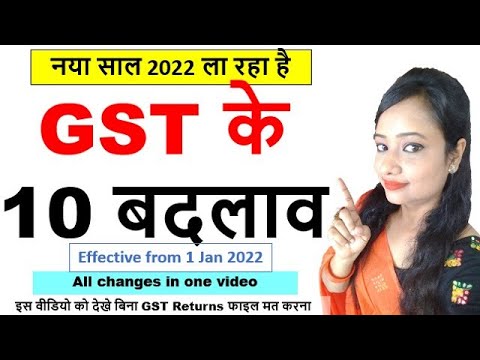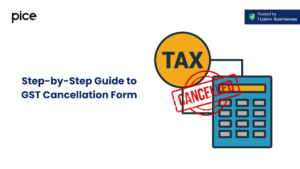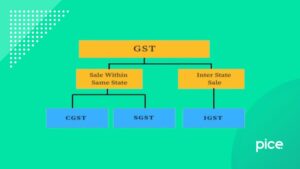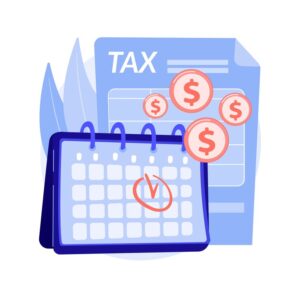An Overview of Recent GST Changes from Jan 1, 2022
- 4 Oct 24
- 10 mins

An Overview of Recent GST Changes from Jan 1, 2022
- Gist of CBIC Notification
- Important Changes in GST Law
- Section 108 of Finance Act, 2021: Scope of Supply
- Section 109 of Finance Act, 2021: Eligibility for Taking ITC
- Section 113 of Finance Act, 2021: Determination of Tax Payment
- Section 114 of Finance Act, 2021: Self-Assessed Tax
- Section 115 of Finance Act, 2021: Provisional Attachment to Protect Revenue in Certain Cases
- Section 116 of Finance Act, 2021: Appeals to Appellate Authority
- Blocking of GSTR-1 for Non-Filing of GSTR-3B
- Correction in Inverted Duty Structure in the Footwear and Textiles Sector
- Mandatory Aadhaar Authentication for GST Refund & Revocation Application
- Revised Rule 36(4): Removal of Provisional ITC in GSTR-3B
- Conclusion
- FAQs
Key Takeaways
- Aadhaar Authentication: Mandatory for GST refunds and revocation from January 2022.
- GSTR-1 Blocking: Filing blocked if GSTR-3B is not submitted for the previous period.
- No Provisional ITC: ITC can only be claimed if invoices are reflected in GSTR-2B.
- Footwear & Textile GST: Uniform 12% GST rate now applies to all products, correcting the inverted duty structure.
- Increased Appeal Penalty: Appellants must pay 25% of the penalty to file an appeal.
The Goods and Services Tax (GST) has been subject to significant changes since its implementation in 2017. All the changes have been made to improve business compliance and simplify the process of law. The recent GST changes from 1 Jan 2022 have several positive impacts.
These changes were introduced through several notifications in the Finance Act, 2021 and notifications given by the Central Board of Indirect Taxes and Customs (CBIC).
In this blog, we will discuss the gist of CBIC notification, important changes in GST laws and more.
Gist of CBIC Notification

As per the notification published by the Central Board of Indirect Taxes and Customs, it has proposed to make the structure of indirect taxation more compact and incorporate some amendments to the Central Goods and Services Tax Act. These amendments include a variety of issues like eligibility criteria for tax credits, rules for filing of return, appeals, etc.
Important Changes in GST Law
Since January 1st, 2022, the GST regime has undergone various tax rate adjustments and procedural changes. A few of these are outlined below.
- When the officer has seized goods, he must issue a notice within a reasonable time period of 7 days, mentioning the penalty amount. Then, he is required to pass an order within the period of issuance of 7 days from the service date of this notice. It is important to abide by the time limit.
- Aadhaar authentication for GST revocation & filing of refund application is mandatory for all GST claims.
- Filing of appeals is only possible if the appellant pays 25% of the penalty payable amount.
- Under sub-section 12 of Section 75, the scope of "Self-Assessed Tax" includes the tax that you need to pay in respect of details of outward supplies, provided under Section 37 but not under Section 39.
- In the textile and footwear sector, all footwear barring cotton will attract a GST of 12%. Additionally, all textile products including readymade garments will attract a GST of 12% as well.
- Amendments have also been made on e-commerce platforms like Zomato, Swiggy, etc. Electronic commerce operators who deal with restaurant services must pay 5% GST on these services instead of hotel suppliers.
- There have been changes in Section 16 of the CGST Act, where clause (aa) has been included. The supplier must debit notes or invoices in GSTR-1. Proper communication of the same needs to be made to the recipient of a debit note or invoice.
- If a registered person fails to file GSTR-3B, he will be blocked from return filing of details of GSTR-1 or IFF facility on the portal.
Section 108 of Finance Act, 2021: Scope of Supply
The Section 108 of the Finance Act, 2021, brought amendments to the Section 7 of the CGST Act, which also defined the scope of supply. The amendment was a clarification that transactions or activities which constitute a supply of goods or services must be in return for consideration unless specified otherwise. This amendment was necessary in determining supply under GST.
The amendment was also a reinforcement of the concept that supply needs to be for the furtherance of business. This ensures personal transactions are not taxable. Goods and Services Tax is levied only on the supply of goods and services made in the course of business.
Section 109 of Finance Act, 2021: Eligibility for Taking ITC
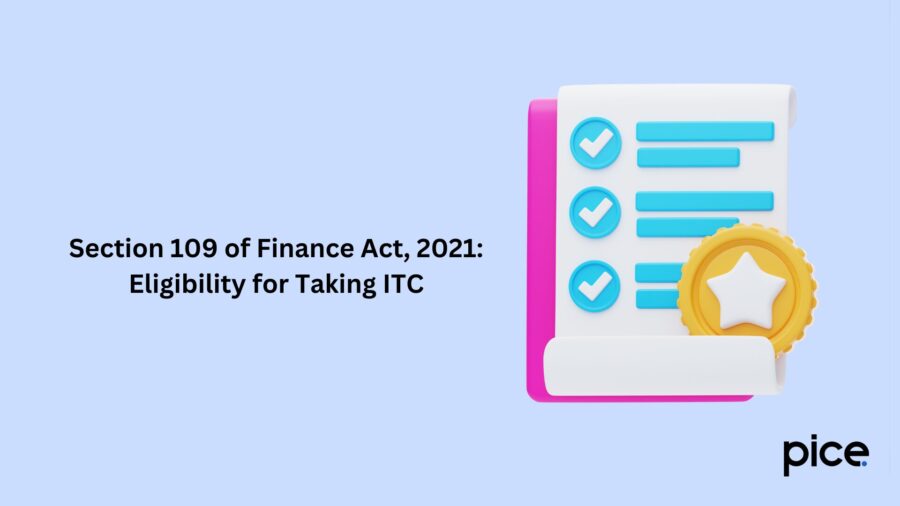
Section 109 of the Finance Act, 2021, amends Section 16 of CGST Act which is about the eligibility for taking ITC. An additional condition for availment of Input Tax Credit (ITC) was introduced. The supplier needs to furnish the debit note or invoice in the statement of outward supplies in Form GSTR-1. These details must be communicated to the invoice or debit note's recipient.
This provision aims to tighten the rules governing credit grants for tax payments on raw materials and different categories of services used by businesses. The seller needs to mandatorily mention the details of monthly sales in Form GSTR-1 so that the buyer can avail ITC.
Section 113 of Finance Act, 2021: Determination of Tax Payment
Section 113 of the Finance Act 2021 makes key amendments to Section 74 of the GST Act, 2017. This provision deals with the determination of tax payments which are either short-paid or not paid. It also deals with refunds and wrong availment or utilisation of Input Tax Credits due to fraudulence, facts suppression or willful misstatement.
This amendment focussed on timely payments. Independent proceedings shall be those which were initiated u/s 129& 130 for seizure, detention, confiscation of goods and e-way bill violations. Additionally, the shutdown of parallel proceedings under Sections 73 and 74 will not lead to the shutdown of proceedings under Sections 129 and 130.
Section 114 of Finance Act, 2021: Self-Assessed Tax
Section 114 of the Finance Act, 2021 brought significant changes to Section 75(12) of the CGST Act. Earlier, the Governmental authority or Government entity had the right to initiate recovery proceedings only with the furnishing of liability in GSTR 3B. With this amendment, it is now easier to recover self-assessed tax liabilities with a mention in GSTR-1 and no inclusion in the FORM GSTR - 3B.
The Self-Assessed Tax will comprise transaction details provided in GSTR-1, which makes it essential to file GSTR-1 correctly.
Section 115 of Finance Act, 2021: Provisional Attachment to Protect Revenue in Certain Cases
Section 115 of the Finance Act aims to make retrospective amendments to Section 83(1) of the Central Goods and Services Tax Act. It expands the scope of provisional attachment to protect revenue. This amendment extends authority to the Commissioner of Central Tax. He has the right to provisional attachment of property including bank accounts of the taxpayer even during an investigation.
However, this rule does not apply to all cases. To initiate the proceedings, determining the GST liability is essential. This amendment provides the tax authorities with powers to secure the government revenue in cases where there may be non-recovery of liability.
Section 116 of Finance Act, 2021: Appeals to Appellate Authority
Section 116 of the Finance Act, 2021 introduced an amendment to Section 107 (6), which deals with appeals to appellate authority. It specifies that there should be no filing of appeal against an order Section 129(3) unless the appellant pays 25% of the disputed amount.
Previously, the appellant was required to make a payment of penalty amounting to 10% in order to file an appeal. This percentage increase ensures that a portion of the amount is with the government during the appeal's pendency.
Blocking of GSTR-1 for Non-Filing of GSTR-3B
As per Rule 59(6) of Central Goods and Service Tax Rules, if a taxable person fails to file GSTR-3B for the previous month, then he will not be able to provide outward supply details in GSTR-1. The taxpayer will not be able to use IFF on the GST portal either if they have a pending filing of GSTR-3B.
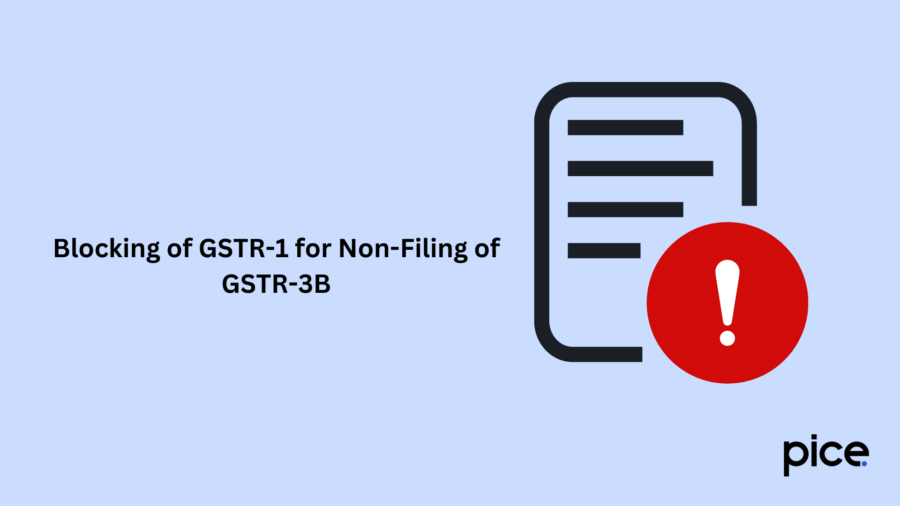
This rule applies to both quarterly and monthly return filing. In the case of monthly return filings, the preceding months would be taken into consideration. For instance, if a taxpayer fails to file GSTR-3B for December 2023, filing of GSTR-1 would be blocked from 1st January 2024.
In the case of quarterly returns, preceding quarters are taken into consideration. In this case, the invoice filing facility (IFF) would also be restricted along with the return filing of GSTR-1. For instance, if you miss filing the return for the October to December quarter, the restriction will apply from the succeeding month.
This essentially ensures the timely filing of GST returns and prevents fake billing. It is a continuation of the facility ‘blocking of e-way bill generation.’
Correction in Inverted Duty Structure in the Footwear and Textiles Sector
The GST Council proposed some changes in the GST rate to correct the inverted duty structure in the textile and footwear sector. A GST rate of 12% will be applicable on all footwear, irrespective of their prices (barring cotton). In cases of textile products, a GST rate of 12% will be applicable on all products and readymade garments. This is a 7% GST rate hike, from 5% to 12%.
Inverted duty structure refers to when the import tariff is lesser on the end product than on raw materials and other items. This results in discouraging domestic manufacture. This is usually seen in cases where producers depend on raw materials which are imported.
Reversal of duty structures is vital to maintain healthy competition with foreign competitors.
Mandatory Aadhaar Authentication for GST Refund & Revocation Application
Filing of application for revocation and Aadhaar authentication are mandatory for claiming all kinds of Goods and Services Tax Refunds. It has been made effective from 1st January 2022.
Revised Rule 36(4): Removal of Provisional ITC in GSTR-3B
The Input Tax Credit that a buyer claims in GST returns for which an invoice is either not reported or yet to be reported by suppliers is known as provisional ITC. From 1st January 2022, clause (aa) under Section 16(2) of the CGST Act has been included, with the removal of provisional ITC from Rule 36(4) (revised).
According to Rule 36(4), a taxable person while filing Form GSTR-3B cannot claim Input Tax Credit in excess of credit available in GSTR-2B.
The total eligible credit amount is calculated according to the input tax credit provisions under GST law and the condition that the suppliers have uploaded the relevant invoices or debit notes, which are reflected in the business's GSTR-2B.
Conclusion
The GST changes from January 1, 2022, signify a crucial phase in India’s tax landscape aligning with the current economic scenario. For both businesses and individuals, it is essential to stay aware of the evolving GST laws to not only ensure tax compliance but also optimise tax strategies.
💡If you want to streamline your payment and make GST payments, consider using the PICE App. Explore the PICE App today and take your export business to new heights.







